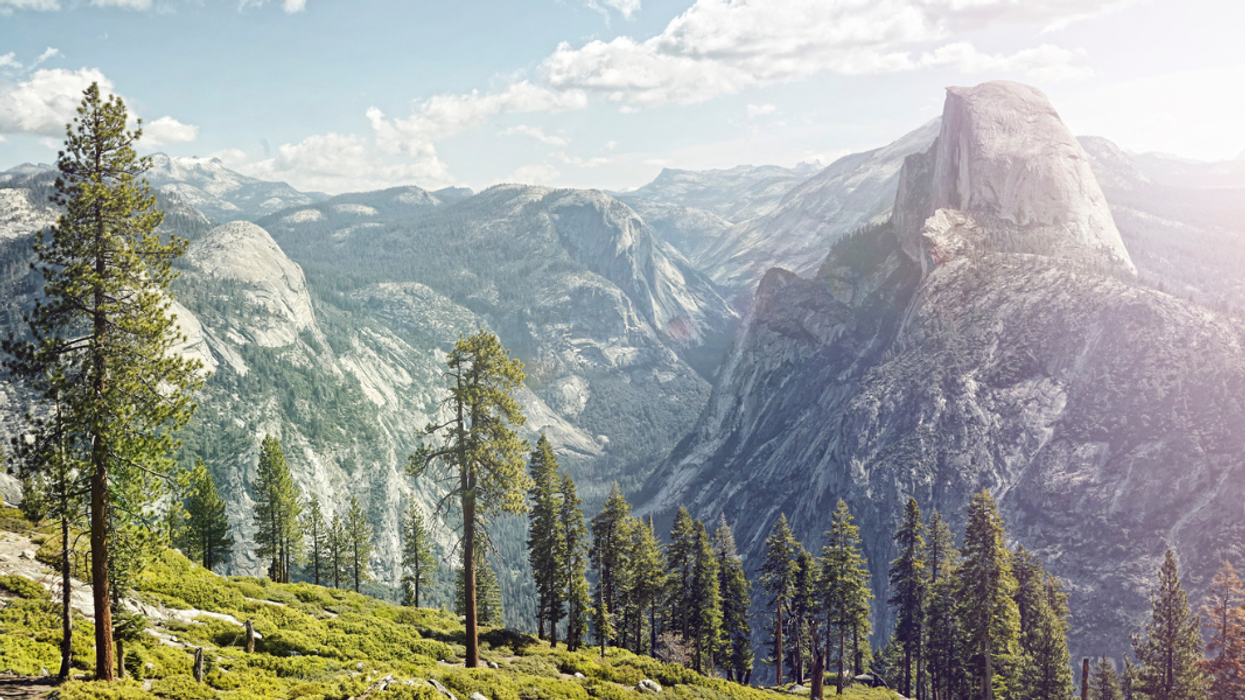Kristina Becvar is the Chief Operating Officer of the Bridge Alliance Education Fund.
The day after celebrating the 4th of July, I embarked on a road trip across the United States. In the past week, I've had the opportunity to travel nearly 4,000 miles across ten states, and the beauty that is the American landscape has not escaped my attention.
Starting from Chicago, I passed through Wisconsin, Minnesota, and most of South Dakota before hitting the "gateway to the west" and the transformative landscape changes that take shape around Badlands National Park. Venturing further into Wyoming and Montana, through the gem that is Yellowstone, and crossing into Idaho and Washington, the diversity of the landscape was matched only by the diversity of culture in the small towns where we stopped for food, gas, or just a break in the drive. I currently find myself in Humboldt County, Northern California, where my youngest studies forestry. As I write this from a lodge in a logging industry town adjacent to one of the most majestic of the remaining redwood forests, I am reminded of the profound impact of the work of Bridge Alliance members in fostering constructive dialogue and finding solutions for our nation's most pressing issues.
Here in Humboldt County, the delicate balance between economic prosperity and environmental conservation has long been a topic of intense debate. Sea levels are rising at an alarming rate, surpassing any other location on the West Coast. The realities of overfishing and increased wildfire risks cannot be ignored, while the livelihoods of local communities and the future of our natural heritage are at stake. However, what struck me most was the community's commitment to open, practical discussions about finding sustainable solutions. Their ability to transcend divisive politics is a blueprint for nationwide climate change action.
This week, I also had the privilege of attending a program presented by the Network for Responsible Public Policy on Climate Change Solutions, featuring esteemed guest speaker Bill McKibben. From his home in flood-ravaged Vermont, McKibben shed light on the urgency of the climate crisis and the need for transformative conversations. The recent record-breaking temperatures and extreme weather events remind us of our collective responsibility to address climate change like never before. We are witnessing a planet unlike any in human history, demanding new and unprecedented conversations.
Amidst these challenges, there is reason for hope. A recent Pew research study revealed that 74 percent of Americans now support international efforts to combat climate change. It is heartening to see strong bipartisan support for alternative fuels, such as solar and wind energy generation, as well as utilizing federal public lands for sustainable solutions. Despite our differences, Americans agree more than we disagree, allowing us to find common ground and develop solutions that meet our collective needs. However, we must navigate the complexities of corporate interests and the politicization of environmental issues, which often hinder progress.
One area where this conflict is evident is in the realm of environmental, social, and governance (ESG) factors in investment and business decisions. While many politicians advocate for the freedom of businesses to make decisions in their best interest, with the Supreme Court ruling last month that the First Amendment protects their right to do so, surrounded by much debate. But the same logic is not being extended to decisions that support innovation in environmental protection. Many states are passing laws restricting the use of ESG factors, despite the lack of evidence suggesting that American CEOs are seeking to harm shareholder value. Understanding the concerns of the next generation of consumers, companies are adapting their products and services towards decarbonization and natural ecosystem-friendly practices. By restricting free market investment and impeding business decisions based on company culture, politicians risk harming taxpayers and pensioners while hindering progress toward a sustainable future. The motives behind such political pushback warrant further scrutiny.
One factor contributing to this pushback is the influence of special interest groups that prioritize corporate profits over environmental health and safety. This interference impedes the necessary cultural shift toward environmental protection and leads to catastrophic incidents such as oil disasters and wildfires. While we may not always have perfect solutions or prevent individuals from prioritizing personal gain over collective health, we must hold our elected officials accountable for their appointments and ensure the highest bidder does not sway those responsible for evaluating government protections.
As Americans, we hold dear our autonomy and freedom, values that manifest in various ways. However, we must rise above our polarized culture and find common ground to address the climate crisis. The future of generations to come depends on our ability to bridge divides, collaborate, and prioritize the health and preservation of our environment.



















 A woman prepares to cast her vote on May 4, 2025 in Bucharest, Romania. The first round of voting begins in the re-run of Romania's presidential election after six months since the original ballot was cancelled due to evidence of Russian influence on the outcome. Then far-right candidate Calin Georgescu surged from less than 5% days before the vote to finish first on 23% despite declaring zero campaign spending. He was subsequently banned from standing in the re-rerun, replaced this time round by George Simion who claims to be a natural ally of Donald Trump.Getty Images, Andrei Pungovschi
A woman prepares to cast her vote on May 4, 2025 in Bucharest, Romania. The first round of voting begins in the re-run of Romania's presidential election after six months since the original ballot was cancelled due to evidence of Russian influence on the outcome. Then far-right candidate Calin Georgescu surged from less than 5% days before the vote to finish first on 23% despite declaring zero campaign spending. He was subsequently banned from standing in the re-rerun, replaced this time round by George Simion who claims to be a natural ally of Donald Trump.Getty Images, Andrei Pungovschi
Trump & Hegseth gave Mark Kelly a huge 2028 gift